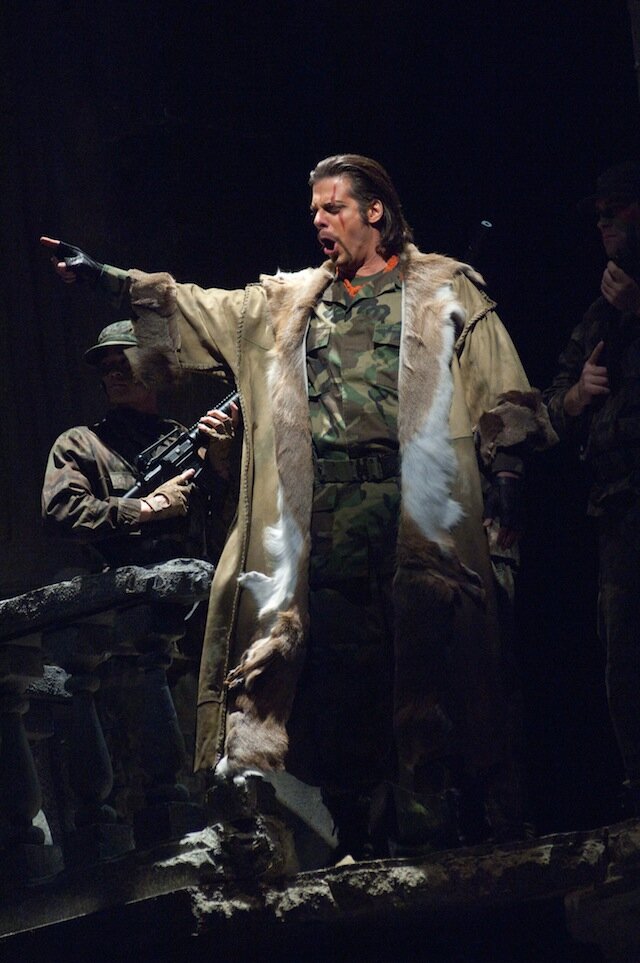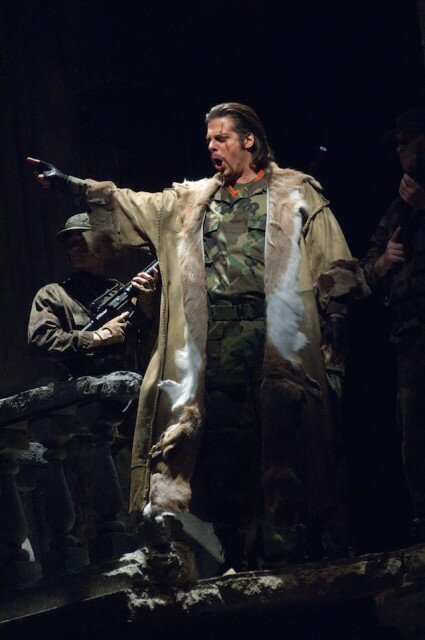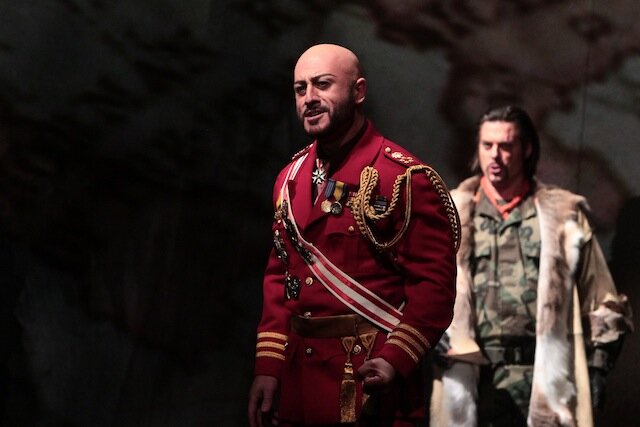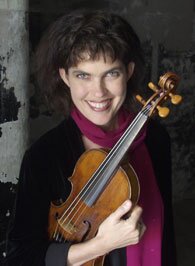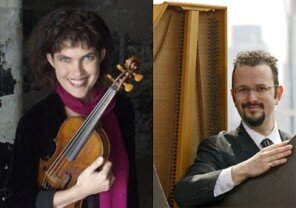Before hearing even a note of the overture to Seattle Opera’s production of Attila (through January 28, tickets), shots rang out on the stage at McCaw Hall and several people fell dead. Bodies got dragged, prisoners got shoved, guns, tanks and explosions lit the background, and by the time the music started, the audience had no illusions this would be a pretty opera.
This relatively early work of Verdi’s, from between Nabucco and Macbeth, has been unjustly neglected. Its rich, colorful music is tautly composed for four solo voices which must be both big and agile, plus two others in smaller roles. Seattle Opera found well-matched singers who easily filled the requirements, and a talented conductor in Carlo Montanaro, who paced and balanced the orchestra with the singers to create a satisfying whole.
General Director Speight Jenkins had gone looking for an affordable opera which would give a prominent role to bass-baritone John Relyea (heard here last season in Don Quichotte), and he wasn’t the only opera director to rediscover Attila, which has been enjoying a mini-boom: at La Scala, Milan, at the Metropolitan Opera, and after Seattle, San Francisco.
To join Relyea as Attila he chose, for the venal Roman general Ezio, baritone Marco Vratogna (who sang it at La Scala); tenor Antonello Palombi as Foresto, leader of the refugees from vanquished Aquileia and lover of Odabella; and for Odabella herself, daughter of the murdered king of the Aquileians and now prisoner, soprano Ana Lucrecia García.
All four have very big voices and are in their prime as singers. Much of the time the music and story require their characters to sing forcefully, but none of these four ever had to strain or push. They could give the music expression and just let their voices out naturally, while at the same time coping with some difficult musical lines. Palombi, who has the most varied character, is a master of also being able to diminish his voice to a perfect pianissimo with great effect in portraying Foresto.
Vratogna’s role is the stiffest and least rewarding (apart from the scarlet general’s uniform he wore replete with gold braid), but like the others he has gorgeous music. Seattle audiences know and value Relyea’s voice with its resonant depth, and this role suits him to a T, lying right in the midst of his range, giving him power and authority, and Palombi is also well known to us and appreciated, but the thrill of the evening came with García’s performance.
Since she last was here as Aida a few years ago, her voice has matured in richness, depth, expressiveness, and all-around beauty. Her first aria in Attila is considered one of the most challenging in all opera, and she nailed it opening night Saturday. It is laden with acrobatic ornaments and runs, going from the top of her range to the bottom in torrents of notes at warp speed, everyone of which she hit perfectly on pitch.
This aria is full of rage and vengeance. For her second she must be sweet and gentle. Here García allowed the smooth, velvety quality of her voice full rein, the only quibble being her choice to scoop up to notes.
Verdi proves himself already a master of choruses in Attila, and Seattle Opera’s chorus makes the most of each one, superbly trained by Beth Kirchhoff. At the end, the chorus had first bow with Kirchhoff in front. The simple set by Charles Edwards came from Opéra national de Rhin, but what made it Seattle’s were the projections at the back and side. Since the company began to use projections in Parsifal almost a decade ago, the staff has become steadily more skillful and the projections more sophisticated until in this opera they were like a chorus commenting on the story.
Warships traveled across the back, a signature machine gun in red was plastered across several backdrop scenes (and stenciled on the backs of Attila’s soldiers), city wreckage appeared, and most chilling of all, there was a map of Italy with smoke apparently rising behind the map, the smoke becoming flames and finally consuming the map. Stage director Bernard Uzan, lighting designer Connie Yun, assistant technical director Chris Reay, and animation and media assistant Peter Lucier contributed to this communal effort, along with the technical staff, and all deserve kudos for the result.
There is not a great deal of lively acting in this opera, but Uzan kept people moving so that it didn’t appear static. Dressing Attila and his soldiers in modern army fatigues, with the Christian Aquileians in timeless refugee garb with flashes of bright blue, and a group of Attila supporters and his prisoners in equally timeless drab robes sounds easily differentiated, but with the fairly dark lighting it was only easy to see who was who when they gathered in big groups and sometimes even that took a while to figure out.
The final scene has the fierce Odabella with Attila at her mercy, on his knees with his head pulled back, and it should end with her swiping off his head with one sweep of her father’s sword. However, this production ends, suddenly, with Odabella taking a gentle trial swing, like a testing golf shot, at Attila’s neck, not even a touch which would draw blood. Surely they could have found a less tame ending? (On the other hand, it would be nice to have Relyea around for the next performance.)
